Last Updated on
I’m sure most musicians would jump at the chance to have a helpful personal assistant guiding them through their songwriting process. Well, with OpenAI’s ChatGPT you can have just that. This chatbot hosts a whole range of impressive features, and among them is the ability to analyze music. As a songwriter, you’re able to use ChatGPT to improve your music; it can provide recommendations to questions and even analyze a song and suggest improvements. Here’s how ChatGPT can help you edit music.
Music editing with ChatGPT
ChatGPT has the helpful feature of responding with detail to questions and prompts about music and music compostion. By subscribing to a ChatGPT Plus or Enterprise account you can even input audio files and it will give you helpful suggestions and recommendations to improve your music.
How does ChatGPT help you edit music?
You might be wondering how ChatGPT helps you edit music. While it can’t edit any music directly, ChatGPT uses a process called machine learning to analyze music files to make recommendations only. This means that it has been trained on lots of music data, and it can use that knowledge to make informed decisions and suggest changes about how to edit your music in the form of a text response.
By inputting samples of your work into the AI chatbot it can then analyze your music composition based on the music data it has been trained with, and make suggestions. You can also input a direct question related to audio files as a prompt and it will answer accordingly. Say you want to gain some perspective on the structure of your song, you can ask Chat GPT what it thinks and it will respond with constructive criticism and suggest improvements.
Who can use ChatGPT to edit music?
Unfortunately, inputting files into ChatGPT is a feature only seen in ChatGPT Plus and Enterprise, meaning that using it to analyze samples of your music is a feature achieved only by paid members. However, this doesn’t mean that you can’t gain any guidance on your music. By simply asking the chatbot specific questions about genre, chord progressions, lyrics, etc. you’re able to edit and improve your music with the chatbot’s help.
How can ChatGPT improve and edit your music?
Suggest chord progressions and lyrics
One of the simplest ways to use ChatGPT in editing and improving your music is to ask for suggestions on chord progressions and lyrics. By inputting the genre of music and some other basic parameters as a prompt it can generate new ideas and help you edit your current ideas based on what it has learned on this particular musical topic.
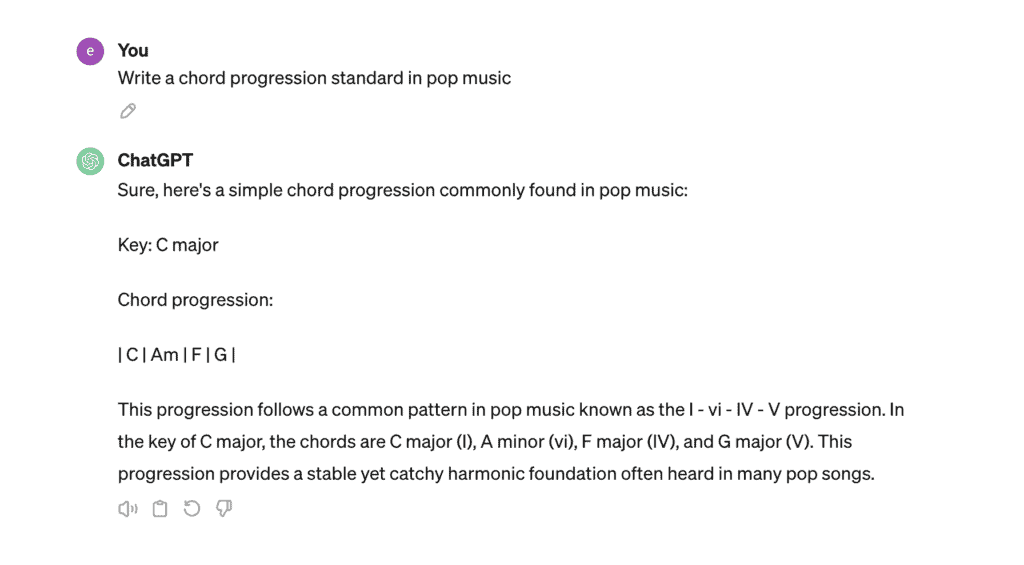
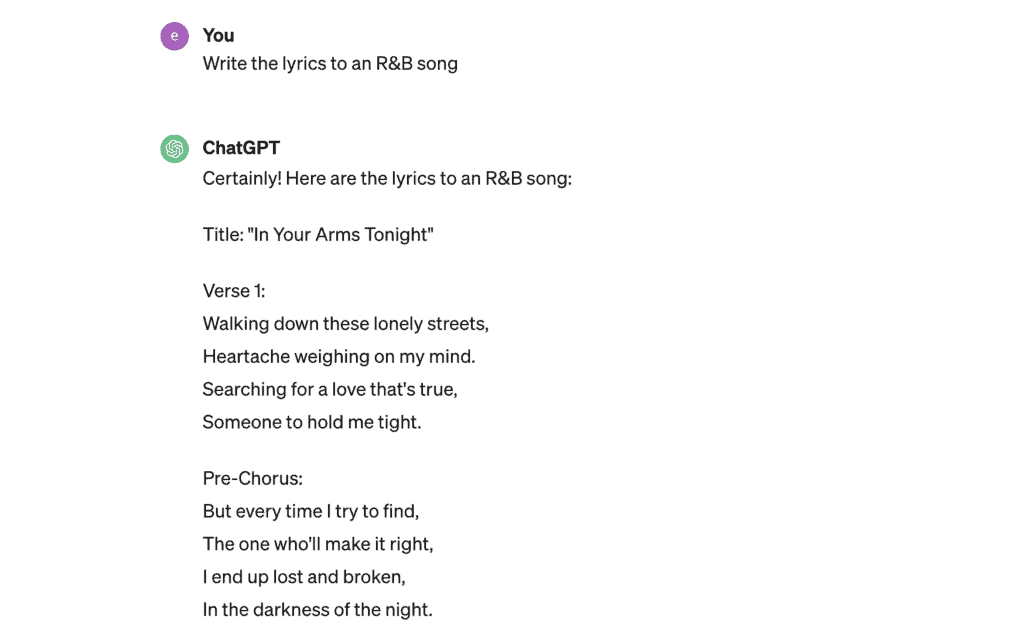
As seen above, ChatGPT can generate new song structures, including completely original verses and chord sequences, in order to help in the songwriting and editing process.
Additionally, users can extend this feature by expanding on songs that are already written and released. For example, you can ask ChatGPT to extend a guitar tab taken from sites like Ultimate Guitar, to create a completely different version of your favorite song!
Change the tempo
One way ChatGPT can edit music is by making suggestions that you can use to change the tempo. The tempo is how fast or slow the music plays. You might want to speed up a song to make it more upbeat or slow it down to make it more relaxing. ChatGPT can help you do this with its different suggestions. The more detail you input about the music’s intended purpose and genre the better ChatGPT’s suggestions will be. If you state that the genre of your song is Jazz, then ChatGPT will retrieve all the information it has learned on Jazz and suggest a tempo change edit.
Extend melodies/ideas
Say you’re stuck with the start of a really catchy melody but have no idea how to finish it. Well, ChatGPT can help! Simply input a short melody into ChatGPT and ask for it to suggest ideas on how to develop it further. ChatGPT will then suggest routes you can take to develop the song further.
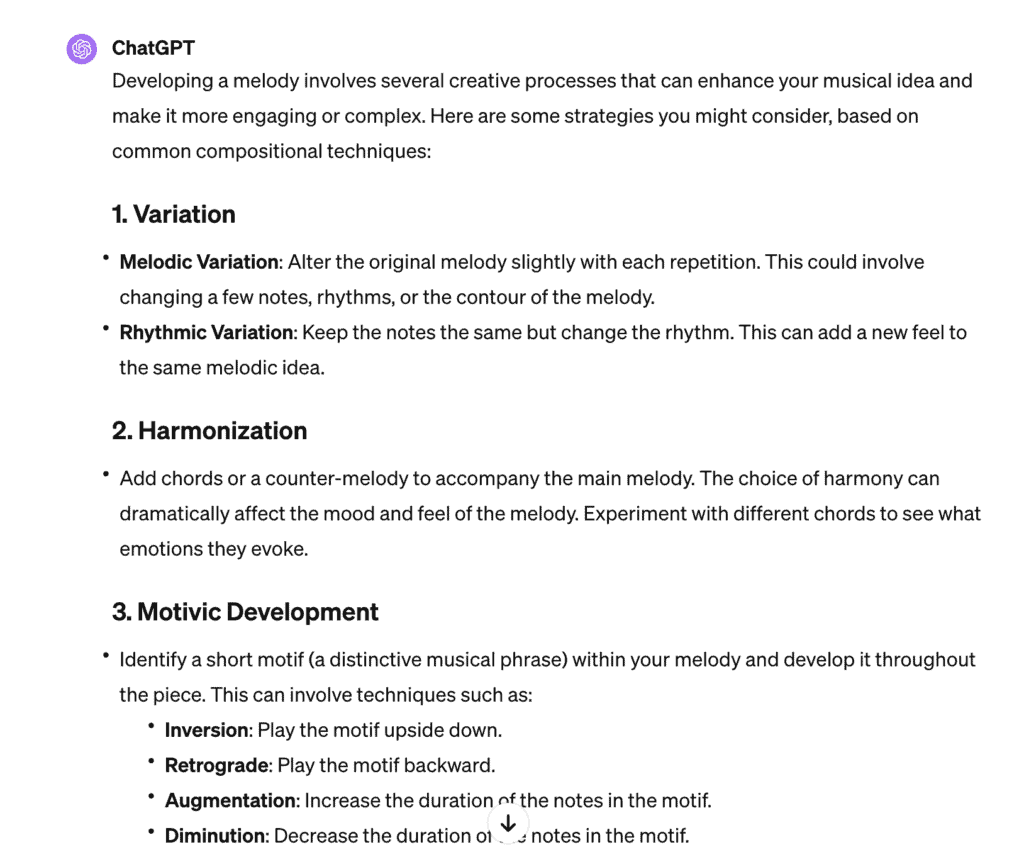
Adjust the Volume
Another way ChatGPT can assist you in editing music is by proposing different changes to adjust the volume. Sometimes you might want certain song parts to be louder or quieter. ChatGPT can help you make those adjustments so the song sounds just right.

ChatGPT – Music Production
In addition to improving the songwriting process, ChatGPT can actually help music producers make edits to compositions in the post-production of a song. By describing the sonic qualities that you’re aiming for ChatGPT can retrieve data on similar examples and make suggestions for mixing and mastering. ChatGPT can make suggestions on EQing, and compression and recommend various processing techniques to help you create a specific mood or atmosphere for your track.
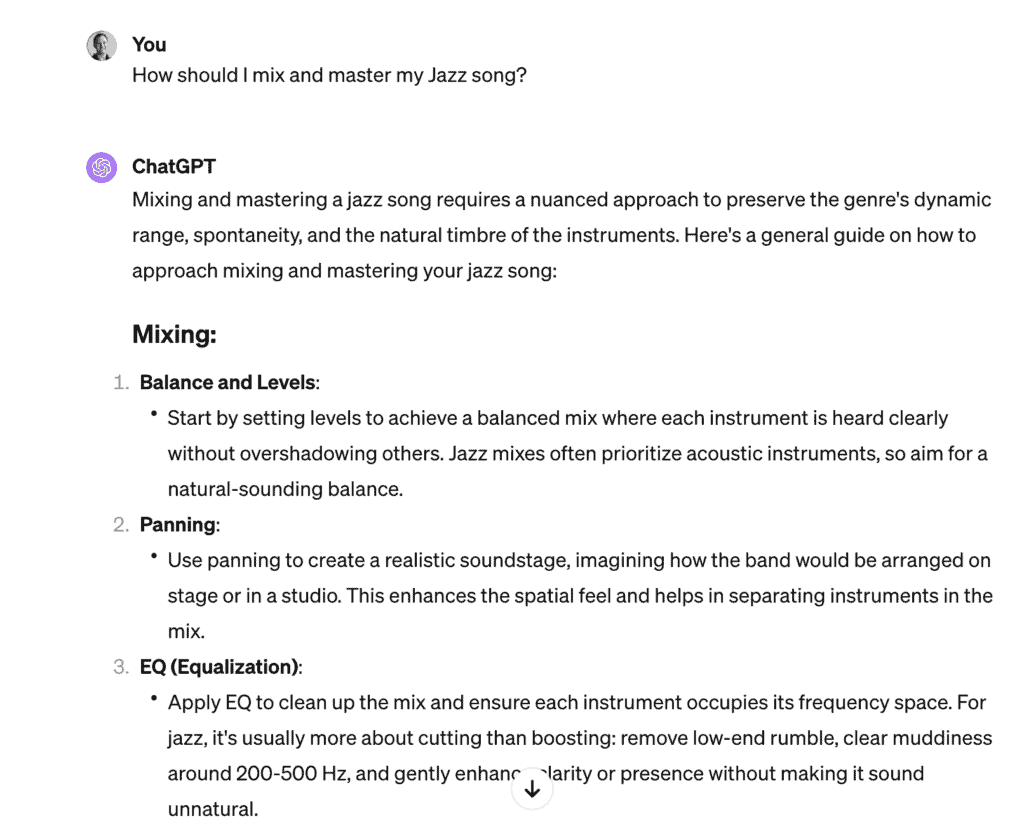
Add Effects
Finally, ChatGPT can also suggest what effects will work on a song. Effects are things like reverb, echo, or distortion. They can make the song sound different and more interesting. ChatGPT can help you choose and apply the right effects to make your song sound great.
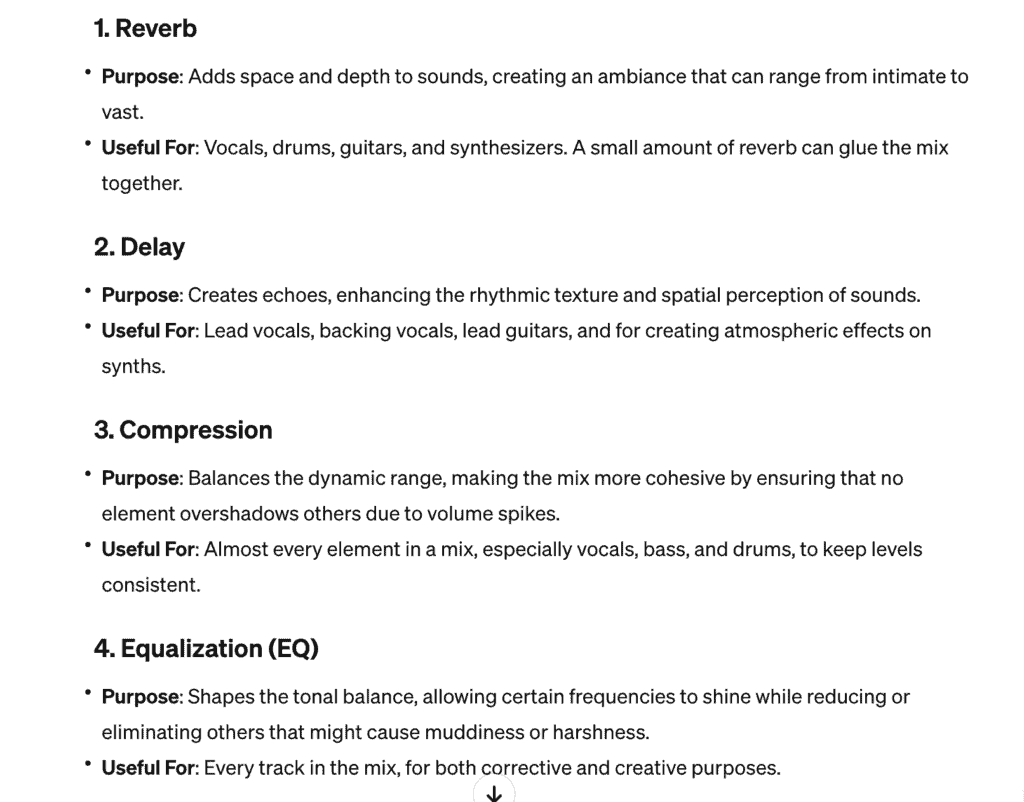
What are the limitations of using ChatGPT to edit music?
As previously mentioned, using ChatGPT to edit music through audio input is only possible for users who have a paid subscription. Therefore, a limitation for users using the free ChatGPT version, is that they’re restricted to text inputs and ChatGPT’s responses may not be as detailed as hoped. Additionally, a limitation is that ChatGPT is not an AI dedicated to music editing and production meaning that some of the suggestions it makes might be quite outlandish, specifically when it is asked more complicated things.
Is ChatGPT better than a human in music editing?
You might wonder if ChatGPT is better than a human at editing music. The answer is that it depends on what you’re looking for. ChatGPT is great at suggesting quick edits to a song, like changing the tempo or adjusting the volume. However, if you want more complex edits, like rearranging the structure of a song or adding new instrumentation, a human is definitely better at this job.
The advancement of AI within the world of music is a hot topic for anyone discussing the future of music creation. While the developments AI has made are certainly impressive, it does beg the question of what it means for smaller creators and musicians if everyone is capable of writing and editing a song without the need for training. Using AI to produce a song is certainly cheaper and may eventually be quicker than employing a human to do it, so what is stopping major labels from doing so?
Conclusion
ChatGPT can’t edit music independently, but it can make suggestions and recommendations in various ways. These include changing the tempo, adjusting the volume, cutting, pasting, and adding effects.
ChatGPT uses machine learning to analyze music files and give tips for improvement. While ChatGPT is great for quick suggestions, it can’t make edits.



